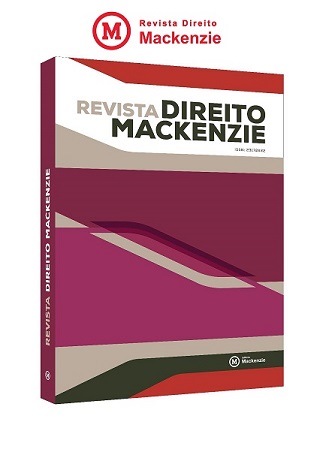LINDB CHANGES AND THE EFFECTIVENESS OF A NEW CONSEQUENCIALIST ADMINISTRATIVE HERMENEUTIC
Keywords:
LINDB., Deferência., Administração pública do medo.Abstract
This article highlights the changes that Law 13.655, of April 25, 2018, caused in LINDB (Law of Introduction to the Rules of Brazilian Law, through an epistemological cut of its articles 20, 21 and 22. For this purpose, it will discuss what is the context in which the standard emerged, going against the hypercontrol exercised over public agents. In this vein, it will discuss how the public administration of fear, a scenario in which managers are afraid to decide, was one of the pillars for legislative innovation. A new hermeneutics, under a consequentialist bias brought about by the legal change, will be analyzed. It will confront critical theses to the law produced by public agents who are part of the external control, with scientific productions of legal interpreters who have shown themselves in favor of the change. the defense that the paradigm shift proposed by the norm, aiming at legal security and efficiency of administrative acts, meets the effectiveness of public policies. rights and rights carved out in the constitutional charter.
References
______. Constituição (1988). Constituição da República Federativa do Brasil. Disponível em: <http://www.planalto.gov.br/ccivil_03/constituicao/constituicao.htm>. Acesso em 05 set. 2021
______. Decreto-Lei nº 4.657, de 4 de setembro de 1942 (Lei de Introdução às Normas do Direito Brasileiro). Disponível em: <http://www.planalto.gov.br/ccivil_03/Decreto-Lei/Del4657.htm>. Acesso em 05 set. 2021.
_____. Índice de percepção da corrupção 2020. Disponível em: <https://transparenciainternacional.org.br/ipc/>. Acesso em 19 set. 2021.
______. Lei nº 13.655, de 25 de abril de 2018. Inclui no Decreto-Lei nº 4.657, de 4 de setembro de 1942 (Lei de Introdução às Normas do Direito Brasileiro), disposições sobre segurança jurídica e eficiência na criação e na aplicação do direito público. Disponível em: <http://www.planalto.gov.br/ccivil_03/_ato2015-2018/2018/lei/L13655.htm>. Acesso em 05 set. 2021.
______. Senado Federal. Disponível em <https://www25.senado.leg.br/web/atividade/materias/-/materia/121664>. Acesso em 15 set. 2021.
______. Tribunal de Contas da União. Parecer do Projeto de Lei nº 7.448/2017. Disponível em: <https://cdn.oantagonista.net/uploads/2018/04/PL-7448-2017-Inteiro-teor-Altera-LINDB-Parecer-Conjur-2018-04-20.pdf>. Acesso em 08 set. 2021.
CARVALHO FILHO, José dos Santos. Manual de direito administrativo. 31ª. ed. rev., atual. e ampl. São Paulo: Atlas, 2017. p. 44.
CAVALCANTI, Francisco. Contexto histórico do direito administrativo brasileiro e os atos administrativos. Revista acadêmica, vol 84, 2012. Disponível em: <https://periodicos.ufpe.br/revistas/ACADEMICA/article/view/356/300>. Acesso em 12 set. 2021.
FRANÇA, Philip Gil. Ato administrativo, consequencialismo e compliance: gestão de riscos , proteção de dados e soluções para o Controle Judicial na Era da IA. 4ª ed. rev., atual. e ampl. São Paulo: Editora Revista dos Tribunais, 2019.
FUNDAÇÃO GETÚLIO VARGAS. Revista de Direito Administrativo. [S. l.], p. 9–11, 2018. DOI: 10.12660/rda.v0.2018.77647. Disponível em: <https://bibliotecadigital.fgv.br/ojs/index.php/rda/article/view/7764>7. Acesso em 05 set. 2021.
GOMES, José Jairo. Lei de Introdução às Normas do Direito Brasileiro: LINDB. São Paulo: Atlas, 2012.
JORDÃO, E. Art. 22 da LIND - Acabou o romance: reforço do pragmatismo no direito público brasileiro. Revista de Direito Administrativo, [S. l.], p. 63–92, 2018. DOI: 10.12660/rda.v0.2018.77650. Disponível em: <https://bibliotecadigital.fgv.br/ojs/index.php/rda/article/view/77650>. Acesso em: 05 set. 2021.
JUSTEN FILHO, M. Art. 20 da LINDB - Dever de transparência, concretude e proporcionalidade nas decisões públicas. Revista de Direito Administrativo, [S. l.], p. 13–41, 2018. DOI: 10.12660/rda.v0.2018.77648. Disponível em: <https://bibliotecadigital.fgv.br/ojs/index.php/rda/article/view/77648>. Acesso em 19 set. 2021.
MACCORMICK, Neil. On legal decision and their consequences; from Dewey to Dworkin. New York Univesity Law Review, vol. 58, nº 2, 1983.
MENDONÇA, J. V. S. de. Art. 21 da LINDB : Indicando consequências e regularizando atos e negócios. Revista de Direito Administrativo, [S. l.], p. 43–61, 2018. DOI: 10.12660/rda.v0.2018.77649. Disponível em: <https://bibliotecadigital.fgv.br/ojs/index.php/rda/article/view/77649>. Acesso em 05 set. 2021.
MIRAGEM, Bruno. Direito administrativo aplicado. 3ªa. ed. rev., atual. e ampl. São Paulo: Editora Revista dos Tribunais, 2017.
MOTTA, Fabrício; NOHARA, Irene. LINDB no direito público: Lei 13.655/2018. São Paulo: Editora Revista dos Tribunais, 2019.
OLIVEIRA, Márcio Luís de. A Constituição juridicamente adequada. 1ª reimp. Belo Horizonte: Editora D’Plácido, 2016.
SOUZA, Luiz Sergio Fernandes de. As recentes alterações da LINDB e suas implicações. Revista Jurídica da Escola Superior do Ministério Público de São Paulo. São Paulo, v. 14. p. 125-132, 2018.
VALLE, Vanice Regina Lírio. Deferência judicial para com as escolhas administrativas: resgatando a objetividade como atributo do controle do poder. Rev. direitos fundam. democ., v. 25, n. 1 p. 110-132, jan./abr. 2020. Disponível em: <https://revistaeletronicardfd.unibrasil.com.br/index.php/rdfd/article/view/1577>. Acesso em 12 set. 2021.
Downloads
Published
Issue
Section
License
Copyright (c) 2022 Hélder Sebastião Santos, Rodolpho Barreto Sampaio Junior

This work is licensed under a Creative Commons Attribution 4.0 International License.
The copyright of the articles published in Mackenzie Law Review belongs to the authors, who grant Mackenzie Presbyterian University the rights of publication of the contents, and the assignment takes effect upon submission of the article, or work in similar form, to the electronic system of institutional publications. The journal reserves the right to make normative, orthographic, and grammatical alterations to the originals, with the aim of maintaining the cultured standard of the language, respecting, however, the style of the authors. The content reported and the opinions expressed by the authors of the articles are their exclusive responsibility.










